Abstract
This study reveals effective ways for implementing and organizing educational workshops for parents and children in the Romanian primary educational system. We have conducted this study in order to discover parents’ vision regarding the frequency, duration and the content of the educational workshops for parents and children. We were also interested in discovering parents’ opinion regarding their availability in participating in workshops in the school environment. The study reveals that the majority of the respondents are interested in participating in workshops for parents and children. Educational workshops are from parents’ perspective a good way of understanding children’s educational needs and to stimulate their multiple intelligences. We have discovered that educational workshops for parents and children should be designed valuing the applications of the theory of multiple intelligences. The results of this study should be used by primary teachers, school principals and school counsellors interested in improving their cooperation with parents. Most of the parents are interested in attending workshops weekly or monthly and are ready to allocate about an hour to those type of activities.
Keywords: Educational workshops for parents and childreneffective learningRomanian primary educational systemthe theory of multiple intelligences
Introduction
Specialty literature offers us an overview of the main characteristics of the educational workshops for parents and children: collaborative educational contexts that involve interactive tasks realized in a positive learning environment. Therefore, we can define educational workshops for children and parents as a formative learning context that promotes student-centred paradigm activities where parent and children cooperate in order to achieve specific educational objectives and to improve children’s learning. Workshops could be considered an effective way of achieving learning objectives. We consider that if the educational activities realized during workshops involve low costs or are free, then they would be much easier to be organized and a large number of parents and children would have the opportunity to attend. Marin & Bocos (2016) discovered that parents of the students enrolled in the preparatory grade consider workshops as an advantageous way to interact with their children and to improve parent-child communication.
Educational workshops for parents and children based on stimulating children’s multiple intelligences.
The theory of multiple intelligences is one of the most known theories that significantly influence the learning processes. Educational workshops for parents and children based on stimulating children’s multiple intelligences are educational contexts where children have the opportunity to develop their intelligences in collaborative contexts with their teachers or parents. For many practitioners, the usage of the theory of multiple intelligences is the key to the harmonious and integral development of the children Stanciu, Orban & Bocos
Problem Statement
This study will address the problem of the benefits of implementing educational workshops for parents and children during the preparatory grade. Theorists and practitioners from the educational field are interested in finding innovative ways for offering students the best educational opportunities (Pancu & Bocos, 2016). Implementing and systematically organizing educational workshops for parents and children is a practice very rarely encountered during the preparatory grade. The preparatory grade marks the beginning of each student life enrolled in the Romanian primary educational system. The majority of the children enrolled in the preparatory grade are 6 or 7 years old. The main purpose of introducing this grade in the primary educational system is to facilitate the process of accommodation in regards to school demands. We consider that the moment of transition between kindergarten specific activities and school instruction is perceived by parents as a very important step in the student’s educational process (Gurlui, 2014). We are interested in discovering if parents and children would like to attend educational workshops in the school environment and how much time they are ready to dedicate to the types of activities that facilitate the process of observing children’s abilities and preferences and stimulate their multiple intelligences. Very few researchers were concerned with understanding the effects of implementing educational workshops for parents and children in the Romanian educational system. However, we consider that it is very useful to discover parents’ vision regarding the period of time and content of the activities.
Research Questions
The central research question was: What are the most effective strategies of organizing educational workshops for parents and children during the preparatory grade? We were also interested to find the answer to the following questions:
Are parents interested in attending educational workshops for parents and children based on stimulating children’s multiple intelligences?
How often and how much time are parents ready to allocate for the educational workshops implemented during the preparatory grade?
What is the parents’ opinion regarding the activities that they can do together with their children?
Purpose of the Study
The main purpose of this study is to find out what is the parents’ opinion regarding the implementation of educational workshops for parents and children based on stimulating children’s multiple intelligences. The theory of multiple intelligences is seen as an effective way of teaching and learning. Generally, teachers from Romanian primary educational system understand the huge benefits of applying this theory to the instructional processes.
Research Methods
The data was collected using a semi-structured questionnaire constructed in order to investigate parents’ opinion regarding the optimum structure, frequency, and content of the educational workshops for parents and children that could be implemented during the preparatory grade. These workshops could be defined as an interactive educational frame, where parents and children cooperate during the learning process. The questionnaire was filled in by 227 parents or legal representatives of children from Cluj County, Romania. Participants answered to 5 closed questions and to an open question. Below, there is a summary of the answers to the questions that were applied.
The results for question 1, “Would you like to participate with your son/daughter to educational activities organized during educational workshops for parents and children that offer the opportunity to better understand children’s needs and preferences, and the chance to stimulate their multiple intelligences?”, showed that most parents, 223 of them (98.24%) selected the affirmative answer, which suggests that they are interested in attending the workshops. (see Figure
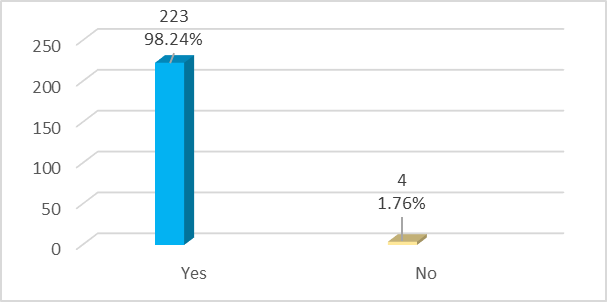
The answers to question 2, “How often can you come to school in order to attend educational workshops for parents and children?”, show that 90 of the respondents considered that they can participate to workshops weekly (39,65%), while 80 of them can attend these activities monthly (35,24%) (see Figure
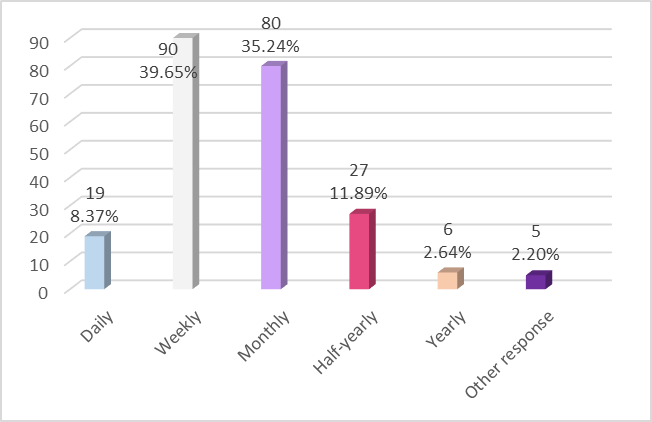
The answers to question number 3, “Which is in your opinion the optimum duration of the workshops that you can attend integrally?”, indicate that the majority of the participants (54.63%) prefer to attend activities that have a duration between 45-60 minutes or of less than 45 minutes (32.16%) (see Figure
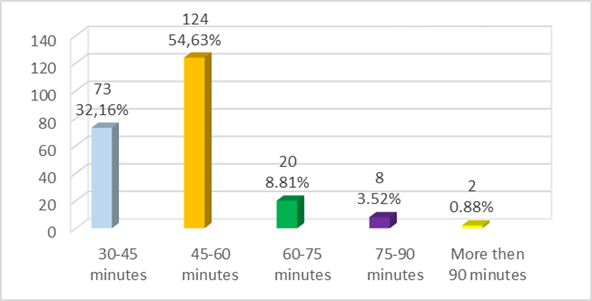
Almost all the participants (99.56%) answered affirmatively to question number 4, “Would you like to know which are the most developed abilities/ multiple intelligences of your son/daughter?”. One of the parents is not interested in finding out information about the intelligence profile of their child. (see Figure
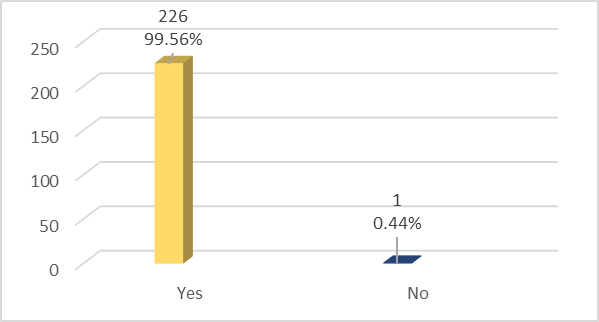
The answers selected for question number 5, “Which of the abilities/multiple intelligences of your child would you like to be stimulated through activities realized during the educational workshops for parents and children?”, indicate that the majority of the parents would like all the types of intelligence to be stimulated during workshops (75,77%). Other parents answered that they wish the most developed intelligences of their children to be stimulated (15,42%), while the rest of them (8,81%) would like the less developed types of intelligence to be stimulated.
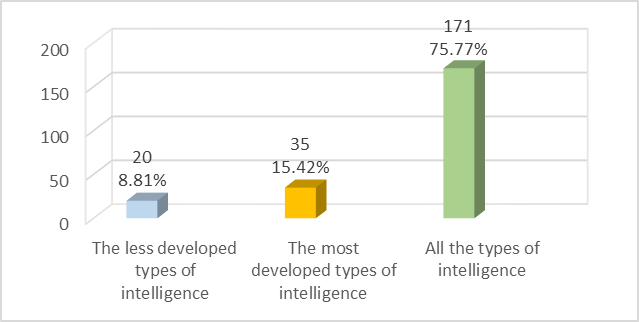
Question number 6 “What are your suggestions or recommendations for primary teachers regarding the content, duration, and frequency of the educational workshops? – The answers submitted are presented in table
Findings
The results of the current paper reveal some important answers regarding the manners in which primary teachers should organize workshops in primary educational level. A remarkable aspect revealed by this study is that the majority of parents are interested in attending workshops weekly or monthly and are ready to allocate about an hour to those type of activities. Analysing the answers makes it evident that parents have positive attitudes towards the theory of multiple intelligences and educational workshops for parents and children. We also found out that most of the parents would like all the types of intelligence of their children to be stimulated during workshops.
Conclusion
The main goal of the study was to investigate parents’ opinion regarding the convenient ways for implementing educational workshops for parents and children during the preparatory grade. Research concerning the organization of collaborative activities for parents and children in the school environment needs further and continuous study. We can conclude that educational workshops should be designed valuing the applications of the theory of multiple intelligences. Some of the limits of this study are the short number of participants and the fact that only the opinions of the parents were taken into consideration. Future investigations should take into account teachers’ and students’ opinions regarding the best strategies for implementing educational workshops for parents and children, based on theory of multiple intelligences applications in the primary educational system.
Acknowledgments
We would like to thank all the participants, teachers and school principals for their support in conducting this study,
References
- Gurlui, I. (2014). Educational partnership in primary education. Procedia Social and Behavioral Sciences, 180, 606–611.
- Marin, D.-C., & Bocos, M. (2016). Characteristics of the Communication between Parents and Students of the Preparatory Class. Barriers, Positive Factors, and Responsibilities of Teachers, Educatia 21 Journal, 14, 1-4.
- Pancu, D.-C, & Bocos, M. (2016). Strategies for Improving School – Family Cooperation in the Romanian Primary Educational System, The European Proceedings of Social & Behavioural Sciences EpSBS, XVIII, 481–486
- Stanciu, D., Orban, I., & Bocos, M. (2011). Applying the Multiple Intelligences Theory into Pedagogical Practice. Lessons from the Romanian Primary Education System, Procedia - Social and Behavioral Sciences, 11, 92-96.
- Vîrtop, S.-A. (2015). Possibilities of Instruction Based on the Students’ Potential and Multiple Intelligences Theory, Procedia - Social and Behavioral Sciences, 191, 1772-1776.
Copyright information

This work is licensed under a Creative Commons Attribution-NonCommercial-NoDerivatives 4.0 International License.
About this article
Publication Date
28 June 2018
Article Doi
eBook ISBN
978-1-80296-040-2
Publisher
Future Academy
Volume
41
Print ISBN (optional)
-
Edition Number
1st Edition
Pages
1-889
Subjects
Teacher, teacher training, teaching skills, teaching techniques, special education, children with special needs
Cite this article as:
Marin, D., & Bocos, M. (2018). Strategies For Implementing Effective Educational Workshops During The Preparatory Grade. In V. Chis, & I. Albulescu (Eds.), Education, Reflection, Development – ERD 2017, vol 41. European Proceedings of Social and Behavioural Sciences (pp. 175-181). Future Academy. https://doi.org/10.15405/epsbs.2018.06.21

